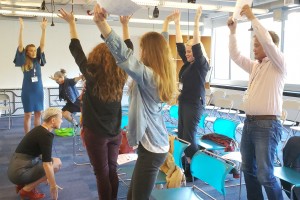
Art and its connection with people with disabilities brought hundreds together at the 2nd International Disability Studies, Arts & Education Conference (DSAE) held at Moore October 3-5, 2019.
Nearly 400 attended 80 workshops and panel sessions presented by artists, educators, scholars, faculty and students. Ten of the presentations were made by Moore faculty, staff and students.
Lauren Stichter, director of art education at Moore and chair of the 2019 DSAE Conference, said the conference was a sell-out, and that people were still signing up as the conference started. No one was turned away, and Stichter said this second conference was almost four times larger than the first one held in Helsinki in 2017.
Guests enjoyed an opening reception Thursday night, October 3, with an exhibition by Harvey Finkle that showcased disabled artists and activists from the Philadelphia region, as well as the screening of the film Defiant Lives, a documentary tracing the origins of the disability rights movement in the United States.
NEW TOOLS
Denise LaBonde, an occupational therapist at Christopher Columbus Charter School in South Philadelphia, signed up for the conference because she was interested in learning new tools to help the children she works with.
"We are all dealing with more and more kids with disabilities, and we need to appreciate where the kid is, and what their experience is," she said. "I personally know, because I have a visual disability, and I had to deal with it in school.... For those kids, you have to step up."
A standing-room only crowd in Moore's Great Hall listened as Friday's keynote speaker LeDerick Horne talked about his learning disability and how he encourages others to share their experiences.
"We call ourselves the largest minority," he said. "We are all touched by disability. Many who work in the disability field either have someone in their lives with a disability, or they have a disability themselves."
Horne suggested the attendees connect with the disability community, help students connect with mentors, and help to create self-advocacy clubs in schools.
Sessions included musical improvisation to help language-impaired students, the representation of disabilities in films, stigma and guilt around mental disability, and management techniques for students with emotional and behavioral disorders.
